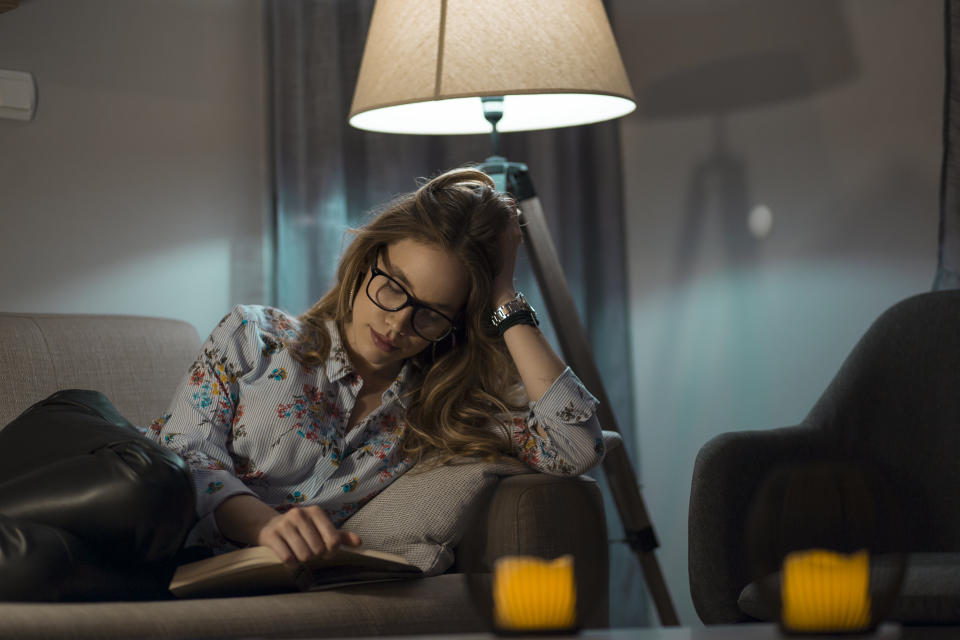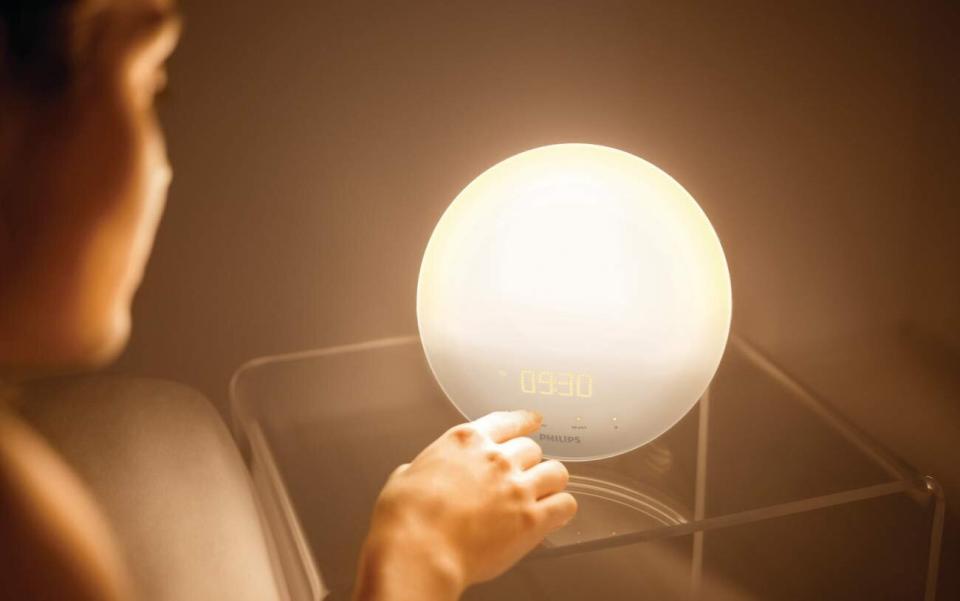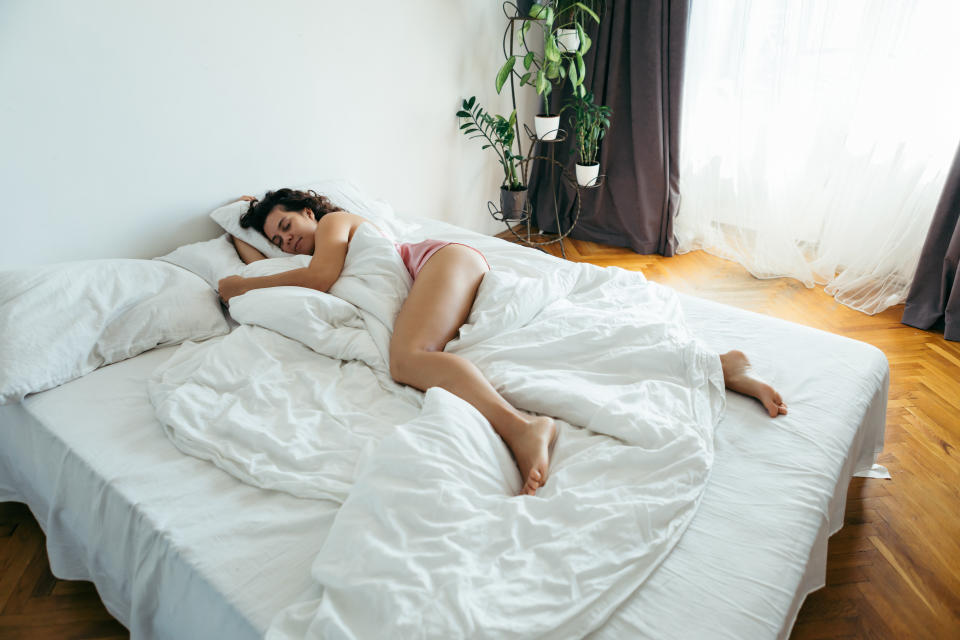Why Some Happy Couples Choose To Sleep In Separate Bedrooms
James* has been married for two decades, but it wasn’t until a couple years ago that he and his wife started sleeping in different rooms.
″[My wife] would constantly kick me awake to stop my snoring, then we would try to race each other back to sleep. Doing this 20 times a night meant no one was getting any decent sleep,” he told HuffPost.
It may not be the traditional setup, but it works for them.
“We have had a couple of friends say how they could never do this — it’s against what marriage is about,” James said. “But let me tell you: Marriage is a lot better when everyone’s well-rested and not grumpy.”
Not much research exists about couples who sleep apart at night. A 2005 National Sleep Foundation report found that 23% of couples opt for separate beds, although one 2017 survey put that number at 14%.
Many people attach a stigma to this less conventional sleeping arrangement and assume it’s a sign that a relationship is on the rocks. While some couples may sleep separately because of marital discord, it’s often for a more practical reason like James and his wife: They just want a good night’s sleep. Maybe one partner snores and the other is a light sleeper. Maybe they have different bedtimes and wake-up times. Perhaps one needs air conditioning or a fan blowing year-round, while the other is perpetually cold.
Whatever the reason, these issues can get in the way of quality shut-eye — and that’s not good for either partner.
Sleeping apart has its benefits.
Getting good sleep on a regular basis is good for your mental and physical health, as well as the health of your relationship.
When you’re well-rested, you are generally a more patient, pleasant and loving version of yourself. When you’re exhausted, you’re more likely to wake up cranky and combative.
A 2013 study from the University of California, Berkeley, confirmed what anyone in a relationship knows to be true: that couples tend to have more frequent and more severe fights after getting poor sleep. And if your partner is the reason you didn’t sleep a wink, then it’s really going to cause some friction.
“Feelings of resentment that build from lying awake each or most nights are destructive for a relationship,” Jennifer Adams, author of “Sleeping Apart Not Falling Apart,” told Good Housekeeping. “And dealing with those feelings of resentment when sleep-deprived is not recommended.”
Separate bedrooms can help a relationship “flourish” because both partners are finally getting the sleep they need, Adams added.
What’s more, when you snooze in different rooms, you can each tailor your own sleeping conditions to your heart’s content. James and his wife now keep their respective bedrooms at their preferred temperatures (76 degrees for her, 70 for him).
When people learn about the couple’s unorthodox sleeping arrangement, their first question is usually about how it’s affected their sex life. Turns out, their sex life hasn’t taken a hit ― it’s actually improved.
“Instead of our evenings being tired all the time, we are able to have romance time more often,” James said. “And if we stay up late, it’s not as hard to recover losing that sleep time as we sleep so much better apart.”
“As far as who goes where, it depends,” he added. “We sort of just follow each other into each other’s bedrooms or slip back and forth whenever the mood strikes.”
Five years into their relationship, Kimberly* and her husband started sleeping separately after she sprained her ankle. She moves around a lot in her sleep, so she thought it would be better not to risk bumping it against him in bed. During this time, Kimberly said she and her husband discovered they actually got better sleep apart than they ever did together. So they kept it going.
“We both snore and I’m a bed hog, even with a king-size bed,” she told HuffPost. “It works out pretty well, especially since we have different work schedules and I usually stay up later than him. I can go to bed at 2 or 3 in the morning without worrying that I’ll wake him.”
Here’s what to know if you’re going to try it
While this arrangement works well for some couples, for others, it may strain the relationship depending on why the couple decided to move to separate rooms in the first place.
“Whether it does damage to the relationship is found in the question of why they are sleeping apart: Do both partners agree to it? Is it temporary?” Becky Whetstone, a marriage and family therapist, told HuffPost.
For example, if you and your spouse are sleeping apart so that your children or pets can sleep in the bed instead, that decision could potentially breed hostility down the line.
“If you are choosing to be with your child over your mate, this says, ‘I value my child over you,’” Whetstone said. “The partner left behind will almost always resent this. In a healthy marriage, your spouse comes first over your child, except in rare and temporary circumstances.”
If you’re contemplating sleeping in separate bedrooms simply to get better sleep, there are a few things to keep in mind so that the arrangement doesn’t damage the relationship:
First, figure out where the sleep issues stem from.
Get to the root of the snoring, sleep talking, tossing and turning or insomnia. Enlist the help of a physician, sleep specialist or therapist who may be able to help you find a solution to the problem, whatever it may be.
“Your noisy or antsy partner could be suffering from a sleep disorder or anxiety problem that could be resolved through therapy, medication or behavioral interventions, which could result in each of you experiencing a restful night’s sleep,” clinical psychologist Ryan Howes told HuffPost.
That means you both can set a goal of sharing a bed again once the situation gets addressed.
“Recognize that sleeping together builds connection and intimacy, and not just sexual,” said Kurt Smith, a therapist who specializes in men’s counseling. “Losing that time together requires an effort by both partners to make up that loss elsewhere.”
Be more intentional about intimacy.
It’s still possible for couples who sleep apart to cultivate intimacy ― they just need to make more of an effort to do so.
“One partner will need to join the other for cuddling, sex and other intimate expressions of love and desire,” Howes said. “They can trade off. Sleep may be a problem, but affection doesn’t need to be sacrificed as well.”
Be willing to make adjustments.
One partner is often more in favor of separate rooms than the other, Smith said. So check in with your spouse regularly to make sure the set-up is still working for them. If not, be open to making some compromises.
“A couple I’m counseling right now has slept in separate bedrooms for a few years now. She thinks it’s great because she gets a restful night’s sleep, but he hates it because it’s also killed their intimacy,” Smith told HuffPost. “To address this, we’re negotiating a couple of nights a month when they do sleep together as well as more effort for physical touch, such as snuggling while watching a show together.”
Keep an open-door policy.
You don’t need to actually leave the bedroom door ajar if you’re a light sleeper, but your partner should know that they’re welcome to come in any time.
“I’d recommend that partners not get too precious about ‘my room’ and ‘your room’ by restricting access or locking doors,” Howes said. “This can challenge the trust the relationship was founded on, raise suspicions and cause a partner to feel shut out or rejected.”
Sync up your sleep schedules, if possible.
Going to bed and waking up at the same time can be tricky if the partners have different work hours or if one is a night owl and the other is an early bird. But do your best to make an effort.
“Given how busy we all are, partners may struggle to find time to regularly connect with each other, and the loss of sleeping in the same bed just compounds this challenge,” Smith said. “I often hear couples describe their daily routines using the phrase like, ‘ships passing in the night,’ because they hardly see each other.”
Expect mixed reactions from others.
Not everyone will understand your decision to sleep in separate bedrooms, and that’s OK. “Some people are envious, while others seem confused and say we just seem like roommates,” Kimberly said.
James and his wife have received similar responses from their friends and family.
“It’s sort of funny because every time they find out, one of them gets a light in their eyes like they would love to do that, too, and the other one shoots it down,” he said. “I’ll also say probably one out of 10 couples we know also have separate bedrooms for pretty much the same reasons we do.”
*Respondents’ last names have been omitted to protect their privacy.
Related...
The 6 Stages Of Sharing A Bed With Your Significant Other
31 Tweets That Perfectly Describe The Struggle Of Sharing A Bed
If You Share A Bed With Your S.O. And A Pet, This Comic Is For You
Also on HuffPost
Blue light-blocking glasses

Brendan Duffy, a certified clinical sleep educator with Start School Later, recommends scrapping all your electronics well before hitting the sheets. But if a full digital detox before bed is too much of a challenge, he suggests trying blue light-blocking glasses. They work to block the blue light that emanates from your computer and phone screens. “Several athletic teams use blue blocker glasses as a way to assist their players that use digital devices late in the evening,” he told HuffPost. <br><br>
Our picks:
There are plenty of blue light-blocking glasses on Amazon, including these Warby Parker-looking clear frames and these flattering-on-everyone tortoise shell frames.
Stocking stuffers that encourage a good bedtime routine

Dr. Kannan Ramar is the president-elect of the American Academy of Sleep Medicine. He’s also a sleep physician, and the professor of medicine in the Division of Pulmonary and Critical Care Medicine at the Mayo Clinic. You could say he’s a guy who knows a thing or two about getting quality zzz's. He recommends leaving your books and Netflix out of the bedroom, and instead using your sheet time for sleep.<br><br>
“You should do these activities in a different room and go to bed when you are sleepy,” he said. “What’s most important is that your bedroom provides a dark, quiet and cool space.”<br><br>
Our picks:
Quality ear plugs and a cult-favorite blackout eye mask are useful stocking stuffers for troubled sleepers who need help blocking out the energy of the day.
A way to unwind before bed without their phone screen

Wendy Troxel, senior behavior and social scientist at the RAND Corporation, recommends a relaxing activity — that does not involve technology — before bed. This could be a bath, a book or conversation with family. <br><br>
“When we race off to bed without any wind-down, it’s really difficult for our brains to be able to shut down and prepare for a deep, restful sleep,” she said.<br><br>
Our picks:
Products like CBD bath salts, relaxing bath bombs or a fun-to-use bathtub tray caddy will encourage a relaxing pre-bed routine that has nothing to do with a phone.
A good book they’ll reach for when they just can’t drift off

“Instead of lying there for hours, staring at the ceiling and wishing oneself to sleep (and likely getting increasingly frustrated), the best strategy is to get out of bed and go to another room and do some relaxing but distracting activity, like reading a book,” Troxel said. “You may find that you get sleepy again, and at that point, you return to bed.”<br><br>
Our picks:
Snag your sleepy friend or family member a copy of a bestseller to crack open when they just can’t shut their brain down after bedtime. In fact, there are plenty of books hitting store shelves this season they might enjoy reading when they’re wide awake at night.
An incentive to get pent-up energy out before bedtime

Terry Cralle, a registered nurse with the Better Sleep Council, has a sleep hack that’s been proven by a recent Brandeis University study: Taking a brisk stroll to walk off any remaining stress and energy prior to hitting the sheets. <br><br>
“Other research has shown that evening exercise does not necessarily disturb your sleep at night as long as you avoid vigorous activity one hour prior to bedtime,” she said. <br><br>
Our picks:
Encourage them to trade in their slippers for a new pair of comfy (and sustainable!) sneakers before bedtime to walk off remaining worries from the day. Otherwise, they might enjoy a fitness tracker like a Fitbit to track their steps and heart rate prior to bedtime.
A sunrise alarm clock, so they can wake with the “dawn”

Sunrise alarm clocks are exactly what they sound like: alarm clocks that wake you up with a simulated sunrise. They work by exposing you to a slowly increasing intensity of morning light for 15 to 30 minutes or more prior to awakening. <br><br>
Cralle, the registered nurse, notes that a previous study demonstrated that light exposure during the last 30 minutes of sleep increased subjective alertness and improved cognitive and physical performance after waking. <br><br>
Our picks:
There are plenty of top-rated sunrise alarm clocks on Amazon worth browsing, like this Philips Wake-Up Light Alarm Clock. Your sleep-deprived friend will thank you.
Gifts to take their sack time to a new level

Dr. Rachel Salas, associate professor of neurology at the Johns Hopkins University School of Medicine, has simple advice we could all use, even if we're usually good about falling asleep and staying asleep. “Wash your sheets regularly,” she said. “Dust mites and allergens can negatively affect your sleep. Also, fresh smells can be helpful.”<br><br>
Our picks:
Gift the insomniac on your list a new set of snooze-worthy sheets they’ll love. Otherwise, a nice-looking air purifier that’s also quiet could be the key to helping them get more shuteye. Don’t forget a small stocking stuffer of bedroom sleep spray to help lull them to dreamland.
A way to soak in some sun during the day, even during winter

What you do during the daytime is also important for a good night’s sleep, says Dr. Sabra Abbott, a sleep specialist from Northwestern Medicine. “While it is important to allow time to wind down before bedtime, getting bright light and activity during the middle of the day can improve your sleep at night.” <br><br>
Our picks:
Changing daylight hours and long working days can mean folks go without natural sunlight for longer than they would like. And for some, that lack of natural light can sap energy, potentially making it harder to fall and stay asleep. Light therapy lamps, like the Carex Day-Light Lamp or the desktop Boxelite Lux Light Therapy Box, might be good solutions for folks who feel like they aren’t getting enough bright light during the day.
Temperature-regulating pajamas

“Temperature regulation is particularly important for sleep quality because overheating disrupts sleep,” said Janet Kennedy, a clinical psychologist and sleep specialist. That’s why she recommends Cool Nights pajamas from Soma Intimates for women. “They perform as advertised, keeping you from overheating as body temperature fluctuates during the night. They look and feel great, too.” For men, try SHEEX moisture-wicking performance sleepwear. They’re made of the same breathable material as SHEEX moisture-wicking sheets.
Love HuffPost? Become a founding member of HuffPost Plus today.
This article originally appeared on HuffPost.


